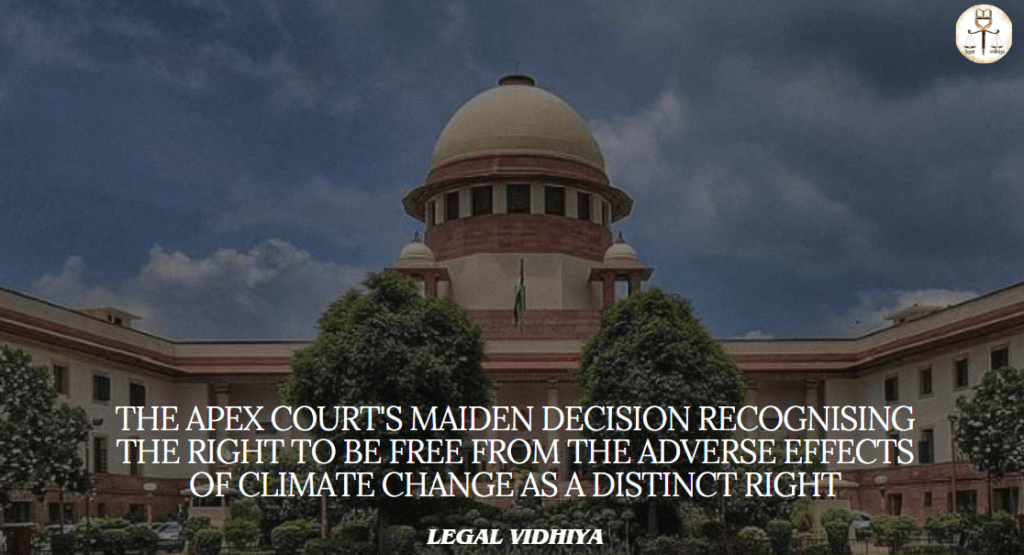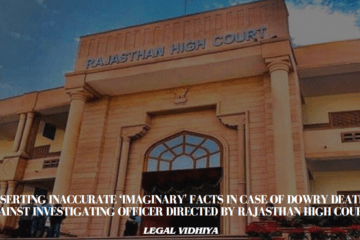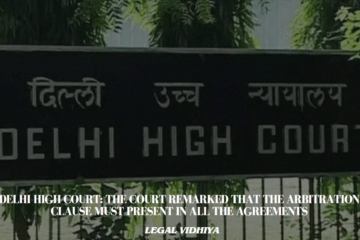
In a recent case, a three-judge bench of the Honorable Supreme Court consisting of the Chief Justice of India Dr.Dhananjaya Y Chandrachud, Justice Manoj Mishra and Justice J B Pardiwala recognized the right to be free from the adverse effect of the climate change as a right under Article 14 and Article 21 of the Indian Constitution .
The judgement was written by the Chief Justice of India which stated that the complete realization of the right to life is impossible without a stable, clean environment that is not affected by the effects of climate change. The right to health, which is a component of the right to life as defined by Article 21, is affected by a number of variables, including air pollution, shifts in vector-borne diseases, temperature increases, droughts, crop failure, shortages of food due to storms, and flooding. Both the right to equality and the right to life are violated when marginalized communities are unable to adjust to climate change or deal with its impacts. For example, poorer communities will be more affected than wealthy ones if severe food and water shortages are brought on by climate change and environmental degradation in a given location. In cases like this, the right to equality would surely be affected, the Court said.
The Honorable Court cited Article 48A that comes under the Directive Principles of State policy which provides that the State shall endeavor to protect and improve the environment and to safeguard the forests and wild life of the country and clause (g) of Article 51A, one of the fundamental duties as enshrined under the Indian Constitution which states that it shall be the duty of every citizen of India to protect and improve the natural environment including forests, lakes, rivers and wild life, and to have compassion for living creatures and added that these two Articles have to be interpreted in light of Article 21 as insisted in M.C.Mehta vs Kamal Nath (2000) 6 SCC 213.
The Honorable Court also quoted Virender Gaur v. State of Haryana (1995) 2 SCC 577, which recognized right to clean environment and Karnataka Industrial Areas Development Board v. C. Kenchappa (2006) 6 SCC 371, Bombay Dyeing & Mfg. Co. Ltd. (3) v. Bombay Environmental Action Group (2006) 3 SCC 434 as precedents addressing the adverse effects of rising sea levels and global temperatures and the major threats posed by climate change to the environment respectively. The Honorable Court noted that despite the existence of several judgments on right to a clean environment and the negative effects of climate change on environment, the people’s right to be free from the harmful effects of climate change has not yet been articulated. And that could be because the right to be free from the adverse effects of the climate change and the right to a clean environment are two sides of the same coin. “As the havoc caused by climate change increases year by year, it becomes necessary to articulate this as a distinct right. It is recognized by Articles 14 and 21”, the Court stated.
The decision came as a result of hearing the plea filed by the Ministry of Environment, Power, and New and Renewable Energy, asking for the Court’s April 2021 order to be modified which sought to prevent the critically endangered Great Indian Bustard (GIB) from dying in collision with power transmission lines installed by solar energy companies in Rajasthan and Gujarat. The previous directive had mandated the undergrounding of all low-voltage power lines and the conversion of existing overhead lines to underground lines in both “potential” (where conservation measures are underway) and “priority” (where the bird is known to live) locations. It had also ordered the underground relocation of high-voltage lines in designated places. The ruling negatively impacted the renewable energy sector, particularly given the area’s significant potential for solar and wind energy, and the adjustment was requested since switching to underground lines was both technically impossible and prohibitively expensive.
The Court has now recalled its earlier order and constituted an expert committee to determine the boundaries of overground and underground wires and perform other remits provided in the judgment.
CASE NAME: M K Ranjitsinh & Ors vs Union of India (Writ Petition (Civil) No. 838 of 2019)
Written by V.Angelin Subiksha, Second year LLB, Government Law College, Vellore, intern under legal vidhiya.
REFERENCES:
M K Ranjitsinh & Ors vs Union of India (Writ Petition (Civil) No. 838 of 2019)
The Constitution of India




0 Comments